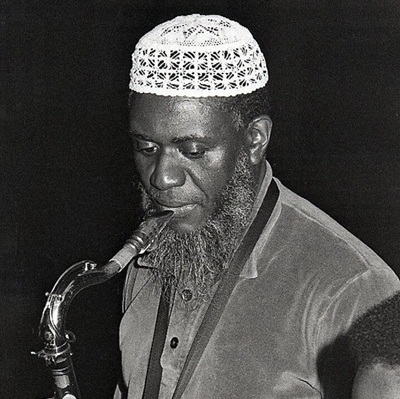Albert Ayler, the Cleveland-born saxophonist whose unorthodox style was inspirational to a generation of free jazz-era and contemporary musicians, is noted in four poems, by four poets
Jazz Guitar Chronicles 9
by John Stupp
Some nights
the guitar was a sledge
the notes peening off like twigs
as I chopped wood
what happened to all those lessons
the Mickey Baker instructional books
Mel Bay?
I sounded like a chainsaw
Ab
Bb
Db
Gb
it was still winter—
all my friend Bernard
could talk about was Albert Ayler
how he was a greater musician than George Szell
that made everybody mad
so Bernard wrote an article about it in the Cleveland Press
after Ayler died
and left Archie Shepp and Pharoah Sanders and all those guys alone
on Mt. Manhattan blowing their horns in the early 70’s
not Albert
his body was found in the East River
he didn’t suffer the police said
but they always say that
this was before the swells in Cleveland went nuts at the thought of George Szell
leaving
and gave the orchestra a bunch of money
each musician got a suitcase full of cash
more than Albert made his entire life
even though they played the same notes most of the time
had names that were harder to pronounce
and bruised easy
______
Through the Valley
(for Albert Ayler)
by Freddington
It begins, as always, with noise.
A clattering announcement of intent,
from the drums of Sonny Murray.
A sonic force to clear the way,
removing obstacles and distractions.
Then Albert enters,
with only a Tenor Sax,
stepping onto the tilted path,
to walk unbalanced,
through omens and visions,
dreams and disarray,
his shrieking dissonance,
creating a shelter,
a tunnel of noise,
to protect himself from harm,
from apparitions,
from ghosts and malice,
from the perils of the journey,
contained within, around and beneath,
circling through the shallows,
from spirits grasping at intruders on the path,
too far along to turn back.
Without fear, he surges ahead,
driven by determination,
straight through the challenges,
the contradictions,
the false hopes and illusions,
Emerging afterwards,
on the other side,
facing the sun,
intact and safe,
high on a mountaintop.
Free, for the moment,
from the evils of the world.
______
Truth Comes Marching In
Remembering Albert and Donald Ayler
By Mark Kerstetter
Names like
Little Bird & Bicycle Horn
missed your tracking
Parker solos faster
backward to the future,
higher than Shaker Heights,
further than armies marching
to spiritual masterlocks
missing the Trane
to the Future Truth
marching in.
French Mayonnaise
sustained journeys
to Sweden & Denmark
where pickup players
kept standard time
while you advanced
in advance of ears
to a Primitive State
tuned to New Truth
in a key Taylor made
to play with Cecil.
As only a few had Ears,
Sense and Prescience,
like Trane & Dolphy
doubling Basses & Snares,
you were locked on a track
between Cleveland & Harlem.
So you shed your bag
of nonessentials
like the Baptist Christ
in favor of
the Ancient Spirit God.
Like a Monk hums
tunes to carry
back to the source
lessons from God
in the shapes of Jazz
to come,
swinging low
from Angels to Devils,
from High Aspiration
to the bloody street
and beyond this world.
From rubato
to no time,
from melody
to Organic Unity,
not playing
but listening,
not musicians
but Spirits
with eyes & ears
disciplined, sobbing
and rejoicing.
Like a dance alternate
called on to perform
who hasn’t yet learned
the steps,
you fumbled
to finger the horn
your brother seemed to know
by heart,
exhaling before you breathed
a single
note.
Play all you can play,
the Whole Spiritual Self,
a thousand things,
moment by moment,
escaping ghettos of mind,
screaming of Peace & Silence,
Revolt & Affirmation,
the chaos of Now,
the promise of what will be,
one long prayer
of listening.
From Jokkmokk to Cleveland,
from La Cave to The Village Gate,
riding a New Wave
not of notes
but of feelings,
marching to the Divine Rhythm
of the Old New Orleans Collective
back to the Beginning
because it’s late
getting ready for the Truth,
because it’s going to happen.
Bells are ringing
for Freedom Riders,
Voters, Summers.
Bells are ringing
for the New Schools,
new laws of Freedom.
Tongues of Bells,
Arms & Legs of Bells
marching Freedom
to the New Music
Ringing Bells.
Get ready to
mix it up like Miles,
black with a patch of white
& a Sunny Peacock
to escape the bars
of Little Rock, Birmingham & Selma.
No shutting white out
like Shepp; tho justified,
Justice demands a march
of the Unified Spirit,
so get ready.
When Truth comes marching in
will we know it?
If a mangled cry
will we hear it?
If Truth comes marching in
with Spirit Titles
but no thin dime
will we face it, or
will we pass up our turn
to change a mind,
when Truth comes marching in?
______
pomegranates (for y.o.) – David Murray at Carlos 1
by Steve Dalachinsky
you see he said I’m getting worried
we’re starting to sound alike –
yes you sound a lot like Sonny
well the song is Tenor Madness he says
& a bit like Albert
gee I wish I sounded a bit like Ayler now
oh but you’re sounding a lot more like yourself
the experimental psychology student wears a thin long sleeved black turtle neck
& she rests her elbows on the table in front of me in the front of the club
she wears a soft subtle smile & her teeth show @ a high point in the solo
her eyes are a soft natural bulge
a shake
oh the women in the house
are cheeks of fresh strawberries
bows of fine spun linen
their earlobes stretched emeralds
hidden clusters of amethyst & ruby
fresh unfolding flowers defying gravity
i miss you because i am alone
& because i miss you
there is a drumming in my soul of insecure longing & lust
of which only you can touch
without having my fear run rampant
so when i am done imagining
i imagine you – i need to solo & be soloed on
the cheeks of the women
are pale pomegranates &
poor promises
the tenor player is not himself tonite
tho sometimes he is.
_________

John Stupp’s third poetry collection Pawleys Island was published in 2017 by Finishing Line Press. His manuscript Summer Job won the 2017 Cathy Smith Bowers Poetry Prize and will be published in 2018 by Main Street Rag. He lives near Pittsburgh, Pennsylvania. From 1975-1985 he worked professionally as a mediocre jazz guitarist.
*
Freddington works as a shipper/receiver in Toronto, Canada, and has been a lifelong jazz fan ever since he was “corrupted” as a teenager by Charles Mingus’ “Wednesday Night Prayer Meeting.”
*

Mark Kerstetter’s poems have appeared in or are forthcoming from Fickle Muses, Connotation Press, Evergreen Review and other journals. He is a winner of the Jerry Jazz Musician New Short Fiction Award and is the former poetry editor of Escape into Life. Please visit him at markkerstetter.com
*

Steve Dalachinsky is a New York downtown poet. He is active in the poetry, music, art, and free jazz scene. Dalachinsky’s main influences are the Beats, William Blake, The Odyssey, obsession, socio-political angst, human disappointment, music (especially Jazz), and visual art with leanings toward abstraction. Dalachinsky’s books include “A Superintendent’s Eyes” (Hozomeen Press 2000), his PEN Award Winning book The Final Nite & Other Poems: Complete Notes From A Charles Gayle Notebook 1987-2006 (Ugly Duckling Presse, 2006), a compendium of poetry written while watching saxophonist Charles Gayle perform throughout New York City in that time period, and “Logos and Language”, co-authored with pianist Matthew Shipp (RogueArt 2008) and Reaching Into The Unknown, a collaboration with French photographer Jacques Bisceglia (RogueArt 2009).
For a complete biography, visit his Wikipedia page.
__________















































It is important not to let Albert’s name,and his music,fade from public notice in the21st
century.The apocalyptic essence of Albert’s unique approach to music,now more than ever,is an announcement of vitality and his own form of mysticism,especially in these
volatile,uncertain times.To me,Albert Ayler remains a shining lighthouse of inspiration.
It is important not to let Albert’s name,and his music,fade from public notice in the21st
century.The apocalyptic essence of Albert’s unique approach to music,now more than ever,is an announcement of vitality and his own form of mysticism,especially in these
volatile,uncertain times.To me,Albert Ayler remains a shining lighthouse of inspiration.